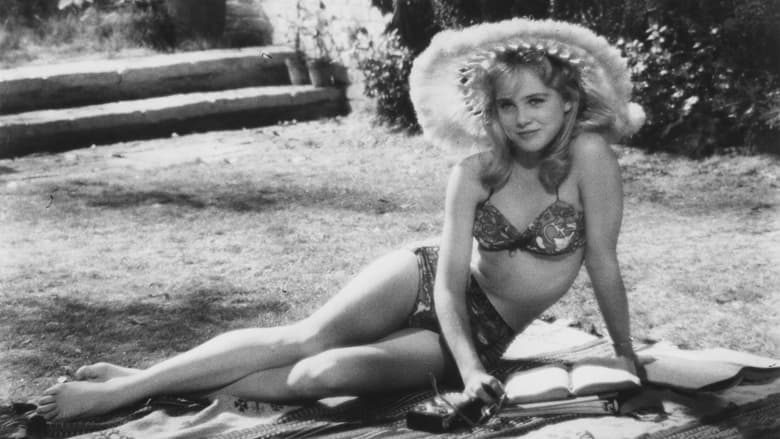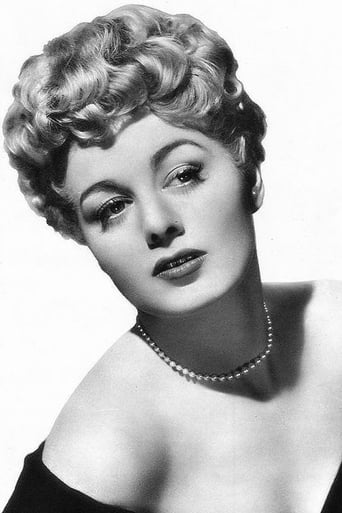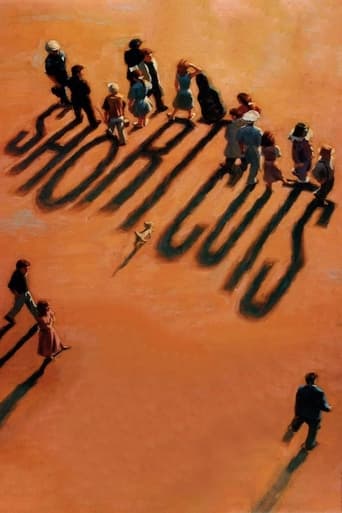

Lolita (1962)
Humbert Humbert is a middle-aged British novelist who is both appalled by and attracted to the vulgarity of American culture. When he comes to stay at the boarding house run by Charlotte Haze, he soon becomes obsessed with Lolita, the woman's teenaged daughter.
Watch Trailer
Cast
Similar titles



Reviews
Such a frustrating disappointment
It's entirely possible that sending the audience out feeling lousy was intentional
One of the worst ways to make a cult movie is to set out to make a cult movie.
The film never slows down or bores, plunging from one harrowing sequence to the next.
LOLITA (1962) directed by: Stanley Kubrick starring: James Mason, Shelley Winters, Peter Sellers cinematography by: Oswald Morris 10 *s out of 10 This masterpiece is misunderstood by some of the masses, and even a small minority of film academics; nonetheless, it is as masterful as anything Kubrick created throughout his entire career, aside from maybe "2001 - A Space Odyssey"; LOLITA is flawless, but I think, honestly, a lot of simple-minded people confuse the lack of visible sex with tameness - they aren't able to read between the lines, so to speak, to eventually see and feel and understand all the depth and texture and detail and meaning that is r e a l l y there; what is implied is a thousand times deeper and more provoking than what is explicitly shown ("not many people know that the chair is painted yellow" says Clare Quilty to Humbert Humbert in the latter half of the opening scene); now, I have read the novel, and it is undoubtedly genius, and nine times out of ten a novel like that could never be successfully adapted to film, but Kubrick really came through here like he always did - even if some idiots don't know it to this day - and expanded and deepened Nabokov's novel, and even managed to reach some sort of "source" or "essence" of Nabokov that not even Nabokov himself managed to pinpoint (that sounds arrogant towards the great Russian writer, but it's just a way of trying to say what I mean); Kubrick's film is, somehow, better than the great novel in a by-default type of sense - one day, like with all of Stanley's films from Paths of Glory onward (Spartacus probably not included, unfortunately) LOLITA will be considered not just one of the greatest films ever made, but one of the greatest pieces of art that humanity has ever made, and I truly believe this; this film is actually downright horrifying once one starts to see and unravel what is actually going on; Kubrick himself ( I do believe) said that he regretted making the film due to all the censorship problems of the era or whatever, but, honestly, I think he was just quite modest as a man outside of the studio - I believe he definitely would have known deep-down that the film was a masterpiece that people would eventually come to understand in time, like people always seem to do with Kubrick films, as if his films truly are, as the axiom goes, ahead of their own times, quite literally; Stanley was, I believe, a lot more in control, every step of the way, of this project than some people think he was - he, in fact, actually took the censorship of the day and used it to his advantage by expertly working with - broadly speaking - subtext, just went wild with it - and, unfortunately, even though this is obvious, it goes over the heads of the masses way too often, for they are only able to the surface (if that) of a film that is now over fifty-five years old .. the film IS deep, and does take multiple-viewings, but this is my point: once you start unraveling the subtexts, and/or that which is 'in-between the lines', things get really freaky really quickly, and then just keep getting stranger and stranger from there; if you honestly believe this film is tame, watch it a couple more times trying to see what is r e a l l y being said, and you'll quickly find how the sex IS there - much more so than that porn-like eroticism and melodrama from the '90s movie starring Jeremy Irons .. I think there are a lot of incidental reasons that cause the masses to think this film isn't excellent, or that it is somehow sub-par when compared to other great films and other great films from Stanley - but the disliking of this masterwork comes from problems with the people watching it, not the film itself; and, of course, some idiots are just still offended by the material, just like back in the day .. but, honestly, LOLITA (1962) is as perfect and divine and endlessly fascinating and rewarding, on every single level - technically or otherwise - as any of the great man's other films .. this is, in a way, a lot like a David Lynch picture, such as "Blue Velvet" or "Mulholland Drive", in the way that it offers a textbook-esque look at some sort of horrifically messed-up underbelly, or inversion, of the idealistic middle-class-American "image" (so to speak); the 'underbelly' that is r e a l l y there in this picture is like a downright terrifying microcosm of .. well .. something akin to what is often called the "underworld". LOLITA (1962) has aged like the finest wine; like with all of his films, Stanley created it for the ages, and it certainly does seem to (maybe ironically considering what some confused people say) resonate more and more with every passing decade, seeming to always become more and more contagious with people, and probably more understood, as well; some of you people need to stop being so pretentious by thinking you can just simply digest a Kubrick film like a small cupcake and then label the movie as average or mediocre just because you're dumb enough to think Kubrick was dumb enough to try and make a film that shows explicit sex with a thirteen or fourteen-year-old girl - he wasn't that dumb, lol, so have some respect and watch it a couple of times further if you didn't dig it at first .. it goes without saying that the sex, in itself, is not explicitly shown - this is obvious and has basically nothing to do anything. Also, some points: the actual look of the film is beyond divine, and I wish Stanley had made just one more black-and-white film after this and "Dr. Strangelove" - it is so extremely well-shot that it's addictive; furthermore, the music by Nelson Riddle and Bob Harris is like a c t u a l l y enchanting - I don't just really mean that as a descriptive adjective, because it really does seem to affect one's being after awhile in an ethereal way; the performances, meanwhile, are some of the best performances ever given in the one-hundred-and-twenty-years (roughly) since actual movies began; and, the way SK structured the picture in relation to the novel, i.e. the way he placed 'Qulity's scene' at the beginning, is downright refreshing and helps so much click. 10 stars out of 10
Like the book, the film is strongest in the beginning, as Humbert Humbert (James Mason) takes a room with a widow (Shelley Winters), only after spotting her teenage daughter (Sue Lyon) lounging around in a bikini. The tension between his forbidden attraction, concealed in sly glances and little gestures, all while Winters practically throws herself at him, is fantastic. Unfortunately, after an event I won't describe to avoid spoiling it, the film drags on and gets a bit ridiculous. The point is to show how ridiculous an infatuation can make a man behave, even if it is taboo, bringing him to humiliation, but the road trip, being pursued, and the recurring character played by Peter Sellers, who is so endearing in the beginning, eventually gets over-used and annoying. The film is far too long at 152 minutes, and another screenwriter should have been used instead of Nabokov. There are several places the film suffers from the Production Code, and we never really feel the sickness of lust from Mason, but Director Stanley Kubrick does get a number of allusions in, and perhaps it's better that the majority of it was left to the imagination. It's disturbing that Sue Lyon was just 14 when filming started, but her performance is impressive, and Shelley Winters is also strong. Kubrick does reasonably well, but errs by wandering into some silly comedic moments, and should have tightened things up. There's enough here to be entertained when you're not cringing though.
The original Vladimir Nabokov novel caused no end of scandal by detailing the romance between a middle-aged intellectual and a 12-year-old nymphet. The affair is "cleansed" ever so slightly in the film by making Lolita a 15-year-old (portrayed by 16-year-old Sue Lyon). In adapting his novel to film, Nabokov downplayed the wicked satire and sensuality of the material, concentrating instead on the story's farcical aspects. James Mason plays professor Humbert Humbert, who while waiting to begin a teaching post in the United States rents a room from blowzy Shelley Winters. Winters immediately falls for the worldly Humbert, but he only has eyes for his landlady's nubile daughter Lolita. The professor goes so far as to marry Winters so that he can remain near to the object of his ardor. Turning up like a bad penny at every opportunity is smarmy TV writer Quilty (Peter Sellers), who seems inordinately interested in Humbert's behavior. When Winters happens to read Humbert's diary, she is so revolted by his lustful thoughts that she runs blindly into the street, where she is struck and killed by a car. Without telling Lolita that her mother is dead, Humbert packs her into the car and goes on a cross-country trip, dogged every inch of the way by a mysterious pursuer. Once she gets over the shock of her mother's death, Lolita is agreeable to inaugurating an affair with her stepfather (this is handled very, very discreetly, despite the slavering critical assessments of 1962). But when the girl begins discovering boys her own age, she drifts away from Humbert. One day, she leaves without warning. This is humiliation enough for Humbert; but when he discovers who her secret lover really is, the results are fatal. We are prepared for the ending because the film has been framed as a flashback; what we are not prepared for is Stanley Kubrick's adroit manipulation of our sympathies and expectations. An incredibly long film considering its subject matter, Lolita is never dull, nor does it ever stoop to the sensationalism prevalent in the film's ad campaign.
I am very fan of Kubrick and watched all his films from Paths of Glory, taking Eyes Wide Shut, and I always have hype to watch the movies of Kubrick, but I admit that the last 2 movies that I watched with him I did not like it that much, Who are Barry Lyndon and Lolita, I found Lolita a very slow-paced film, Kubrick's direction is good, but it's well below other works, the cast is good, and the performances are good, the plot is good, and the Dialogues are mostly good too, photography is good, the black and white tone matches the film, and the soundtrack is good, but the film did not please me, I found it tiring and with a very slow pace, I expected more from this film Kubrick, but not bad. Note 6.4









